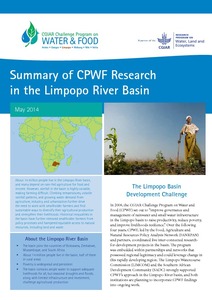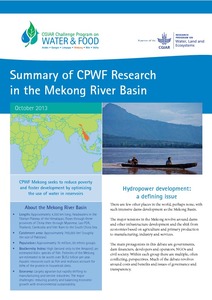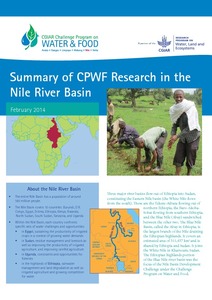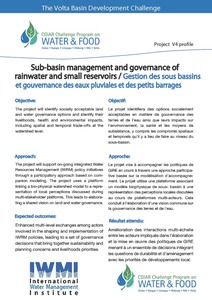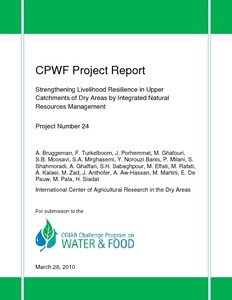Summary of CPWF Research in the Limpopo River Basin
In 2009, the CGIAR Challenge Program on Water and Food (CPWF) set out to “improve governance and management of rainwater and small water infrastructure in the Limpopo basin to raise productivity, reduce poverty, and improve livelihoods resilience.” Over the following four years, CPWF, led by the Food, Agriculture and Natural Resources Policy Analysis Network (FANRPAN) and partners, coordinated five inter-connected research- for-development projects in the basin. The program
Study of vector aspects of mosquito-borne diseases in some irrigation schemes in Sri Lanka
Summary of CPWF Research in the Mekong River Basin
Hydropower development: a defining issue
There are few other places in the world, perhaps none, with such intensive dams development as the Mekong Basin.
The major tensions in the Mekong revolve around dams and other infrastructure development and the shift from economies based on agriculture and primary production to manufacturing, industry and services.
Storing and sharing water in sand rivers: A water balance modelling approach
Study on cost effective irrigation modernization strategies for the 1990s. Final report
Summary of CPWF research in the Nile river basin
Three major river basins flow out of Ethiopia into Sudan, constituting the Eastern Nile basin (the White Nile flows from the south). These are the Tekeze-Atbara flowing out of northern Ethiopia, the Baro-Akoba- Sobat flowing from southern Ethiopia, and the Blue Nile (Abay) sandwiched between the other two. The Blue Nile Basin, called the Abay in Ethiopia, is the largest branch of the Nile draining the Ethiopian highlands. It covers an estimated area of 311,437 square kilometers and is shared by Ethiopia and Sudan. It joins the White Nile in Khartoum, Sudan.
Sub-basin management and governance of rainwater and small reservoirs
The project will identify socially acceptable land and water governance options and identify their livelihoods, health and environmental impacts, including spatial and temporal trade-offs at the watershed level.
Strengthening livelihood resilience in upper catchments of dry areas by integrated natural resources management
The Livelihood Resilience project evolved around the hypothesis that better integrated
management can improve the livelihoods of poor farming communities and increase the
environmental integrity and water productivity of upstream watersheds in dry areas. This
hypothesis was tested by researchers from different Iranian research and executive organizations
and farming communities in two benchmark research watersheds in upper Karkheh River Basin in
Iran, under the guidance of the ICARDA scientists. Participatory technology development, water,


